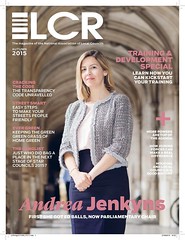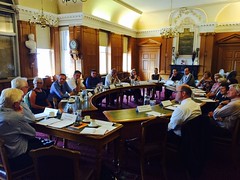Following on from my below post, here is an article I recently wrote for http://www.londonsays.org/ on new local councils in London:
For many years people living in communities across England have had the right, if there is local support, to set up a local council. In rural areas these are usually called parish councils although there is no link to any church, and in more populated areas they are often called town councils. But not in London. Until now residents of the capital have been specifically prohibited from setting up a council that represents their neighbourhood or community.
This is changing. One of the provisions of the recent Local Government and Public Involvement in Health Act aims to enhance community governance across the country, but particularly in urban areas. Communities in London now have the same right to establish local councils as exists elsewhere. This ends the anomaly which has previously prevented Londoners from setting up local councils and now enables grass roots governance in the capital where people want it.
Londoners, familiar with only their particular London Borough council and the London Assembly, may, if they so choose, take advantage of establishing a local council in the same way residents in any other part of the country have and continue to do so. Londoners need to decide what geographical area their local council would cover and these will vary to suit local wishes. They may include formerly separate local authority areas in the outer boroughs such as those with Surrey, Kent or Essex postal addresses, town centres throughout the capital, London’s “villages”, districts defined as New Deal for Community areas under various regeneration programmes or easily definable housing estates.
Being a sceptical lot and whose perception of the activities and services of their Borough council may be negative, Londoners may question the benefits of having a smaller local council in the same area. For a start, the structure of local government is acknowledged as being fairly remote from people. In European countries, the most local of democratically elected representatives will often represent just a few hundred people, and everyone knows who their representative is. In London, a borough councillor will often represent nine or ten thousand people.
So the first benefit is any local council will be made up of elected representatives who must have a direct connection to that locality or neighbourhood and who then qualify to truly represent the interests of local people. Decisions on a range of issues specific to that area can then be made as locally as possible and based on the strength of the views of local people. This helps people feel that local government is relevant to them and to their lives. It also means their views can be easily heard and acted upon promptly. This already happens in over 8,500 communities up and down the country, where local councils of all shapes and sizes are a central part of the fabric of the community, so why not in London?
Local councils have a wide range of legal powers and can invest in the community to meet and deliver its aspirations through the precept, a form of council tax. In stark contrast to the £76 billion spent in the rest of local government, local councils do not receive money from Government, but raise money directly from their community – local councils raised around £400 million this year. As is often the case, this acts a lever for drawing in further investment and funding from other sources. Because Borough councils are large and with a complex range of functions, they need large numbers of staff and complex structures. But because a local neighbourhood council is concentrating on a relatively small area, overheads are low, and numbers of staff can in some cases be counted on one hand. The result is that the money is then carefully invested to provide and maintain a range of very local services ranging from sporting, entertainment and tourist facilities, community centres, car parks, crime reduction measures, open spaces for recreational use and bus shelters. These are all highly desirable visible services designed to meet the particular needs of local people, and with the expenditure remaining under very local control.
The versatility of local councils is a distinct feature, as they have a wide remit for activities in which they can get involved with, and can focus upon the priorities that emerge from within the community. For example, they may choose to fund dedicated community development workers to help them develop their vision for their area through a community-led plan. They might want to pay for a new Police Community Support Officer, or respond to queries from individual residents and represent the needs and interests of the community to other service providers.
Local councils provide a meaningful and effective conduit for local people to get involved with local services or issues they would not otherwise be able to. They can act as a focus for really empowering the local community, by stimulating action to improve services, providing facilities and supporting the aspirations of local people. Interestingly, there are many successful local councils around the country made up of people who are elected as independents and they operate in a bi-partisan way. The local councillors will all have their own views on national politics and vote in national elections accordingly, but in order to improve their neighbourhood, they often choose not to stand for election wearing a party hat.
So the National Association has long been an advocate of extending and developing the role of local councils. We have persistently made the case that neighbourhood and local community governance is becoming increasingly relevant and its spread should be encouraged, and particularly in urban areas.
We have strongly welcomed the Government’s recent commitment to local democracy through its white paper on community empowerment and we believe the creation of new local councils can be an excellent way of achieving this objective. We have also been heartened by the support for neighbourhood councils shown by all three main political parties. This support was reinforced at their respective recent party conferences, with each vying to be the party of localism and devolution of power to people and communities.
However, the exciting prospect of local people starting to plan to set up neighbourhood councils in their own bit of London has raised eyebrows and come in for criticism from some quarters. Possibly predictably this is usually from people already in positions of power and who may feel threatened. This is unlikely to improve the already low levels of trust in politicians. We also fully understand concerns raised about community cohesion. This is vitally important, but one of the reasons and benefits for establishing local councils is their ability to contribute and enhance community cohesion. Any rise in extremism at local council level would be as much a failure of the political parties and our democracy collectively rather than of a particular local government system. Local councils are well placed to lead and organise events to celebrate the fact that in their areas there are so many different faiths and cultures living and working together. A local council in Milton Keynes, for example, has been highlighted by the Home Office for their work in this area.
Only by giving local people a real voice and say over the way services are provided will communities feel connected to their governance and democracy. The key principle must be to empower communities, not restrict the democratic process. People and communities should not be constrained by people who are already in positions of power and responsibility seemingly taking the view that an extension of democracy is a good thing but Londoners are not quite ready for it yet.
Ultimately people have to be trusted to take a little more control over the things that most affect their day to day lives. People and communities in London now have a right to set up a local neighbourhood council if they want one. We believe that Londoners should be allowed to decide what is best for them and take decisions accordingly.










Hi Justin, got this link from an email you sent to Fabian. It’s a really good read and have seen it just in time ahead of tomorrow’s meeting. The turnout at the campaign launch last Saturday was really inspiring and makes us feel that we are indeed doing the right thing for our community.
A big thank you for all your support to date, and in the months ahead.